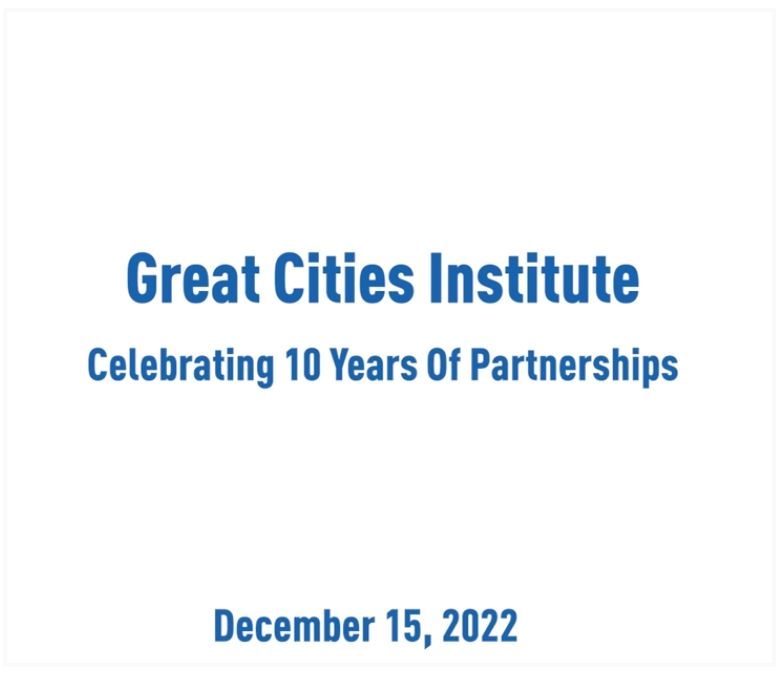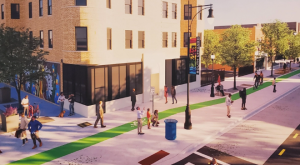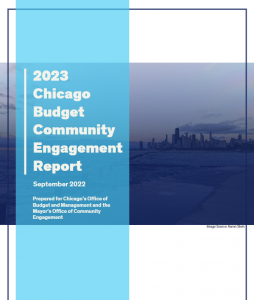
Rob Paral, senior research specialist at the Great Cities Institute, commented in the Economist in its story, “Chicago’s Woes Are Over-Hyped.”
Read the Full Article at the Economist Here.

Rob Paral, senior research specialist at the Great Cities Institute, commented in the Economist in its story, “Chicago’s Woes Are Over-Hyped.”

We are hosting our special event titled “Celebrating our Partners & Marking 10 Years of Leadership.”
Speakers included Lieutenant Governor Juliana Stratton, Interim Chancellor Javier Reyes, Juan González of Democracy Now, Teresa Córdova, and a panel on democracy led by Kathleen Yang-Clayton.
The panel included four brilliant professionals in the public and advocacy fields and was moderated by Kathleen Yang-Clayton, one of our Senior Research Fellows at Great Cities Institute.
Agenda
4:00 p.m. Welcome, Teresa Córdova, Director, Great Cities Institute
4:15 p.m. Democracy Now – More than Ever, Juan González, Co-Host, Democracy Now!
4:45 p.m. Panel Conversation, Moderated by Professor Kathleen Yang Clayton:
Maria Hadden, Alderwoman, 49th Ward
Cristina Pacione-Zayas, Illinois State Senator, 20th District
Erica Swinney Staley, Executive Director, Manufacturing Renaissance
Heather Van Benthuysen, Executive Director, CPS Student Voice and Engagement Department
5:30 p.m. Greetings, Chancellor Javier Reyes
5:40 p.m. Closing Remarks, Lieutenant Governor Juliana Stratton
6:00 p.m. Reception
Authors
Yannet Lathrop
Matthew D. Wilson
William Lester
Introduction and Executive Summary
Ten years ago, on November 29, 2012, a group of 200 fast-food workers in New York City— fed up with low pay and roadblocks to organizing—walked out of their jobs demanding a $15 hourly wage and a union. At the time, the New York Times described the strike as “the biggest wave of job actions in the history of America’s fast-food industry.”
That “biggest wave of job actions,” led by Black workers and other workers of color, would not stay contained to the fast-food industry for long. Over the course of the decade that followed, the Fight for $15—as the movement inspired by the strikes would come to be known—spread from coast to coast, animating workers across industries to join the demand for higher wages. To date, 29 states and nearly five dozen cities and counties have raised their wage floors since 2012—many to $15 an hour or more. In addition, employers of all sizes—including some of the world’s largest corporations employing tens of millions of workers—have been inspired or compelled to raise their pay scales. As a result, since 2012, more than 26 million workers have won higher pay to the tune of $150 billion. 2 Nearly half (46 percent) of the benefiting workers are workers of color, whose additional earnings amount to slightly over 50 percent ($76 billion) of the estimated higher pay.

Associate Director, Matthew Wilson, assisted with a research report on the fight to raise minimum wage. Authors Juliana Kaplan and Madison Hoff write about the report in their Business Insider article:
“The biggest finding is the equity impact of the fight for 15 raises,” Yannet Lathrop, a senior researcher and policy analyst for the National Employment Law Project and one of the report’s authors, told Insider. “We find that between 2013 and 2019, in general, worker wealth grew, but it was faster in states that adopted higher wages than those that didn’t adopt higher wages.”

Great Cities is featured in another Block Club Chicago article!
The project has its roots in a community revitalization plan led by Special Service Area No. 5 and the University of Illinois at Chicago’s Great Cities Institute, Ald. Susan Sadlowski Garza (10th) said.
Neighbors identified a need for “a more pedestrian- and cyclist-friendly Commercial Avenue, with improved lighting and a more aesthetically pleasing streetscape,” Sadlowski Garza said.
Special Service Area No. 5 also brought permanent public art, vendor stalls and other upgrades to Commercial Avenue through the Chicago Alfresco program last year.

Associate Director Thea Crum is interviewed by ABC 7 on Great Cities Institute’s work on participatory budgeting.
Through participatory budgeting, community members get a voice. They can propose neighborhood infrastructure projects in their wards, such as road or park improvements, and those projects then go up for a vote in the community.
“So, you’re seeing this beautiful co-creative process between residents and local government where they’re really working together to actualize real community needs on the ground,” said Thea Crum, associate director at Great Cities Institute at UIC.
The institute has taken the lead on spreading the word about participatory budgeting in Chicago, and that includes targeting populations who can’t legally vote.
Designed in 2015 and first implemented in Chicago and San Francisco, CITY CITÉ is a transatlantic cooperation and exchange program on urban issues and city making, initiated by Villa Albertine. The 3rd Chicago edition entitled ” Re/Inventing City Planning to Address Contemporary Issues ” will be a two days of professional conference and visits on the renewal of the urban fabric and territorial planning in both cities.
Thursday, October 13 – 8.30 am – 5 pm @ Studio Gang – Conferences
9.00 am | Introduction
9.15 am – 10.45 am | Session 1: Panorama and Perspectives from Paris and Chicago: New Scales and Approaches for Planning
Moderation: Teresa Córdova (UIC- Great Cities Institute)
We Will Chicago Plan
ON TO 2050 Strategy
City Planning in Paris (PLU, SCOT, SDRIF…)
New Methods and Approaches to Planning with We Will Chicago
The New Flexible Models of Planning: Call for Projects and Temporary Urbanism
Temporalities and Uncertainties in Urban Planning: towards “permanent autopoetic processes”
11.00 am – 12.30 am | Session 2: Planning for Social and Spatial Justice
Moderation: Monica Chadha (Civic Projects Architecture)
Invest South-West
Thinking Communal Space : A Vehicle for Social Equity
Planning for Equity with Stakeholders and Communities
GROWSS in sync, Quality of Life Plan for North Lawndale
Neighborhood Activation, A Process to Improve Public Safety Through Community-Led Design
2 pm – 3.30 pm | Session 3: Planning for Transitions
Moderation: Odile Compagnon (Odile Compagnon Architect)
The Natural History of Chicago — and its Implications
Ecological Transition and the Place of Life / Wildlife in Planning
Institutional Narratives of Energy and Youth Awareness of Climate Issues
Advancing Equity by Investing in Urban Green Infrastructure
Towards Pluralist Engagement in Cultural Infrastructure Design
3.45 pm – 5.15 pm | Session 4: Future of Housing & Offices
Moderation: Kathleen Day (Preservation of Affordable Housing)
What kind of Housing will be Built in Chicago in the 2020s? Effects of Recent Reforms
Which Future for Business Districts in an Area of Environmental and Social Transformation?
How Cities Support Urban Manufacturing? Old and New Forms of Production Spaces
Short-Term Rental Platforms and the Transformation of Housing: the Challenges of Regulation
Aspirational Housing – What is Architect and Developer’s Responsibility? How can we Create Better Places to Live for Everyone?
Friday, October 14 | On-site visits
9.00 am – 10.20 am: Woodlawn Resource Center
10.35 am – 11.40 am: Stony Island Arts Bank
12.10 am – 2.00 pm: Fulton East
2.15 pm – 3.25 pm: North Lawndale Love Blooms Here Plaza
3.40 pm – 5.00 pm: Humboldt Park

Join us for a talk by Professor Ananya Roy!
Professor Ananya Roy is a scholar of global racial capitalism and postcolonial development whose research is concerned with the political economy and politics of dispossession and displacement. At the very heart of her work is an insistence on the transformation of the public university – through teaching, public scholarship, and community engagement – so that it can be a force for social justice.
She is the author of numerous books, including: City Requiem, Calcutta: Gender and the Politics of Poverty; Encountering Poverty: Thinking and Acting in an Unequal World, and Poverty Capital: Microfinance and the Making of Development. Dr. Roy currently leads a National Science Foundation Research Coordination Network on Housing Justice in Unequal Cities.
Talk sponsored by Social Justice Initiative, Institute for Research on Race and Public Policy, The Great Cities Institute and Center for Urban Economic Development
RSVP online:
https://OrganizingKnowledge.eventbrite.com

Authors Shruti Singh and Isis Almeida discuss issues caused by historical segregation in their Bloomberg article. Great Cities Institute’s Matt Wilson is interviewed and highlights the economic inequalities in Chicago.
Many of these same neighborhoods continue to face the highest levels of joblessness, poverty and inadequate housing, according to a study by the Great Cities Institute at the University of Illinois Chicago.
“These places of concentrated disadvantages are where unemployment is most concentrated and crime is most concentrated, and there is an interplay,” said Matthew Wilson, associate director for economic and workforce development at the institute. “They play off each other to create the inequities we see in the city.”

On October 3, 2022 Mayor Lori Lightfoot delivered her $16.4 billion budget for the City of Chicago to City Council. In July, the City conducted a community engagement process and partnered with UIC’s Neighborhoods Initiative (UICNI) at the Great Cities Institute to design and engagement activities around the City’s 2023 budget. The “2023 Chicago Budget Community Engagement Report” documents the 2023 Budget Engagement process and provides key results from the engagement activities.
2023 budget engagement activities were built upon community-identified investment needs derived from the 2022 budget engagement process and findings that the City of Chicago refers to as “Responsive Initiatives.” To create meaningful engagement, the 2023 budget engagement process focused on establishing and reinforcing a feedback loop between City leaders and residents that:
Data was collected across all engagement activities, from conversations with City leaders and from tabletop notes during roundtable discussions, written comment cards, surveys, filled-out forms about Responsive Initiatives, and verbal public comment from community members. The UIC team analyzed the data to report findings as reflected by participant responses to the survey, filled-out forms about Responsive Initiatives, written comment cards, and transcribed public comments are provided in the appendix.
This report includes engagement findings as related to the entire budget process, as well as across four budget topic areas: Affordable Housing and Services to People At Risk of or Experiencing Homelessness, Community Safety and Youth, Public Health and Services and Mental Health, and Neighborhood/Community Development and Arts and Culture. In terms of overall feedback, participants throughout the community engagement process and across all City programs and services raised the issue of needing:
For topic area–specific feedback, participants were asked to prioritize programs and services that they thought were most important to their community. Participant responses in areas of success and progress corresponded generally to three themes:
The Office of Budget and Management (OBM) used participant feedback and the analysis of participant feedback provided in the 2023 Chicago Budget Community Engagement Report to create the 2023 Responsive Initiatives as part of the budget decision making process. The Responsive Initiatives are tied to specific departments and programs and services proposed for funding. As mentioned above, as part of the engagement activities participants identified performance metrics (specific changes that represent success or progress) against which the City’s progress and performance on the 2023 Responsive Initiatives can be measured. OBM has selected 16 of these performance metrics that are measurable and align well with one or several specific 2023 Responsive Initiatives to track progress. The City released the 2023 Budget Engagement Responsive Initiatives Report that includes both the 2023 Responsive Initiatives and corresponding engagement performance metrics on the 2023 Budget Engagement microsite.